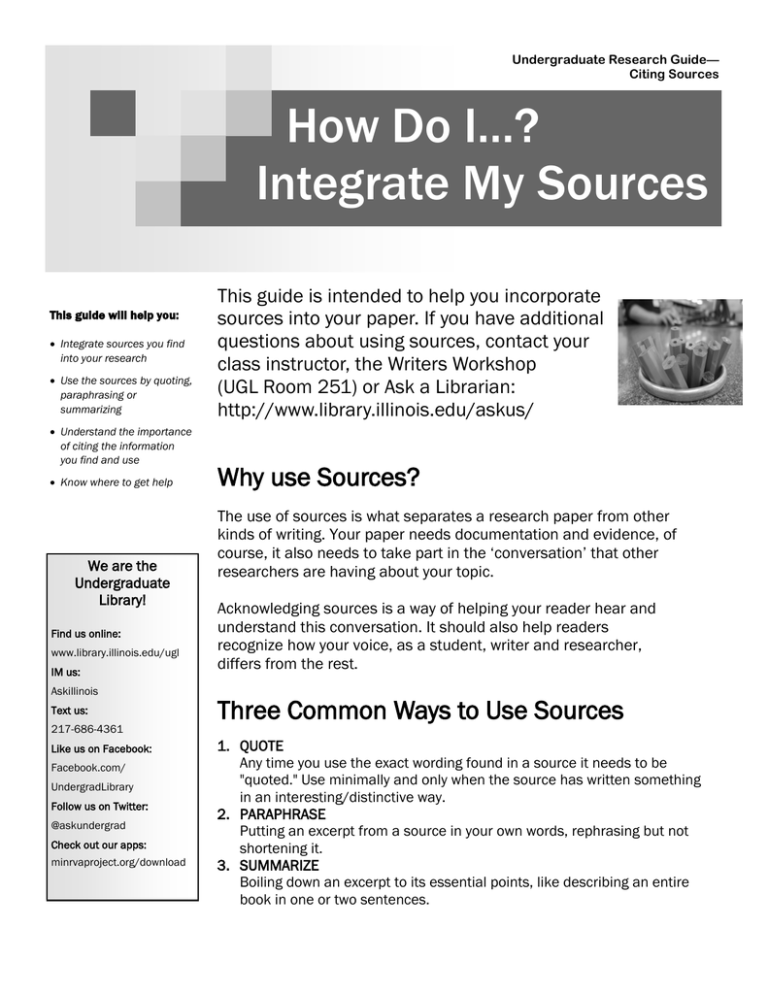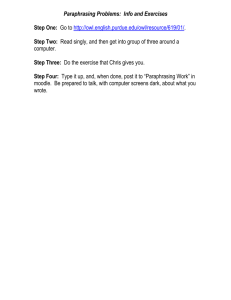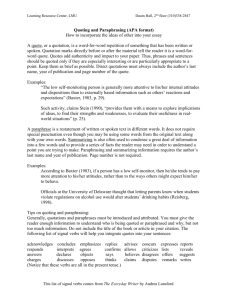How Do I…? Integrate My Sources
advertisement

Undergraduate Research Guide— Citing Sources How Do I…? Integrate My Sources This guide will help you: Integrate sources you find into your research Use the sources by quoting, paraphrasing or summarizing Understand the importance of citing the information you find and use Know where to get help We are the Undergraduate Library! Find us online: www.library.illinois.edu/ugl IM us: Askillinois Text us: 217-686-4361 Like us on Facebook: Facebook.com/ UndergradLibrary Follow us on Twitter: @askundergrad Check out our apps: minrvaproject.org/download This guide is intended to help you incorporate sources into your paper. If you have additional questions about using sources, contact your class instructor, the Writers Workshop (UGL Room 251) or Ask a Librarian: http://www.library.illinois.edu/askus/ Why use Sources? The use of sources is what separates a research paper from other kinds of writing. Your paper needs documentation and evidence, of course, it also needs to take part in the ‘conversation’ that other researchers are having about your topic. Acknowledging sources is a way of helping your reader hear and understand this conversation. It should also help readers recognize how your voice, as a student, writer and researcher, differs from the rest. Three Common Ways to Use Sources 1. QUOTE Any time you use the exact wording found in a source it needs to be "quoted." Use minimally and only when the source has written something in an interesting/distinctive way. 2. PARAPHRASE Putting an excerpt from a source in your own words, rephrasing but not shortening it. 3. SUMMARIZE Boiling down an excerpt to its essential points, like describing an entire book in one or two sentences. How Do I…? Tips for Quoting, Paraphrasing & Summarizing Remember that all three methods require a citation! Limit block quotes (long, direct quotations from a source) as much as possible. Avoid this: “A quotation from a source without any explanation.” Always explain where a quotation is from and why it’s interesting. Analyze its language and explain its relevance to your research question. Introducing and commenting on every quotation, paraphrase and summary makes it easier to distinguish your voice from the source’s voice. Summaries are handy when you need to explain a lot of sources in a small space, to help the reader understand the background of your topic. Choose your words carefully to emphasize the most relevant aspects of longer passages. Where to Get More Help UIUC’s Writers Workshop Tips on using quotations http://www.cws.illinois.edu/workshop/writers/tips/quotations The OWL (Purdue’s Online Writing Lab) Tips on quoting, paraphrasing and summarizing http://www.owl.english.purdue.edu/owl/resource/563/01/ Citation Styles UGL page on how to cite sources http://www.library.illinois.edu/ugl/howdoi/citations.html Ask A Librarian Contact us in person, or via phone, chat, email or text http://www.library.illinois.edu/askus/ Page 2


